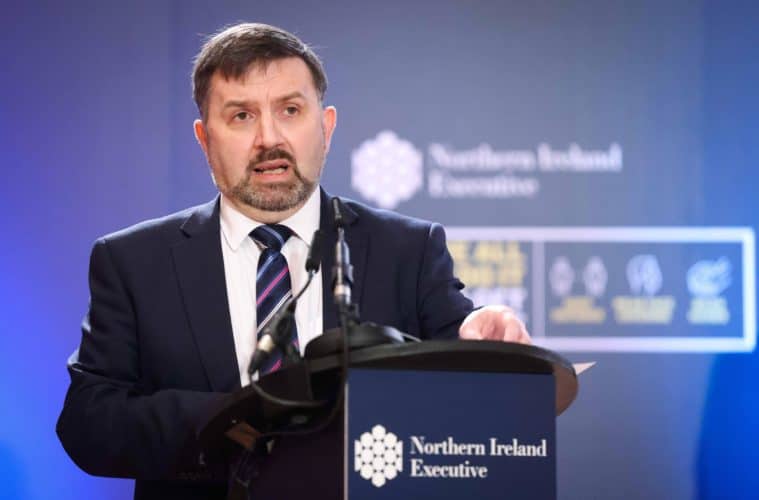Health Minister Robin Swann has launched a new Elective Care Framework for Northern Ireland, setting out a detailed roadmap for tackling hospital waiting lists.
The Minister today said he wanted to “restore hope” to people waiting for hospital care in pain and discomfort.
The Framework proposes a £700m investment over five years. It sets out a twin track approach of investment and reform – targeted investment to get many more people treated as quickly as possible, plus reform and investment to eradicate the gap between demand and capacity and ensure backlogs do not keep re-occurring
“I realise this is a big ask at a time when there are many financial demands on our public sector. However, we should have no illusions that this is a crisis that has already dragged on far too long,” Mr Swann today stated.
“The time for talk is over. What we need now is concerted action.”
This framework contains a range of short term, medium term and longer term actions.
It makes clear that the waiting list crisis has been building up for seven years and has been seriously exacerbated by the COVID-19 pandemic. There are no quick fixes to the situation.
The plans detailed in this document include: implementation of “green pathways” with every effort made to keep elected care services entirely separate from any exposure to COVID-19; expansion of the elective care centre model with surgeries provided in ring fenced specialist hubs; a relentless regional NI-wide approach rather than a disjointed postcode lottery system; delivery of megaclinics for outpatient, assessment and pre-operative assessment clinics; improved data, reporting and accountability; continued focus on performance management; ongoing close cooperation with the independent sector; development of in-house HSC capacity including continued investment in staffing and use of temporary, enhanced rates for targeted shifts.
“These are just some of the examples of a suite of initiatives. It will take all these and many more to properly turn the situation around,” the Health Minister stated.
“I want long waits to have been fully banished by March 2026. The Framework sets a target for March 2026 of no patient waiting more than 52 weeks for a first outpatient appointment and inpatient/day case treatment; or 26 weeks for a diagnostics appointment.
“If we can bring forward this timeline we will obviously do so, but we have to acknowledge the scale of the problem that has built up and the capacity restrictions that will limit our room for manoeuvre.
“For example, there are currently almost 190,000 patients waiting more than a year for their first outpatient appointment. This is almost five times as many as when the abortive 2017 Elective Care Plan was published.
“The plans include crucial and sustained investment in building up the in-house capacity of our health service.
“If we don’t eradicate the gap between demand and capacity then the backlogs in care will keep re-occurring. Up until 2014, the gap was managed through in year funding injections to facilitate additional activity. Those monies have been in shorter supply since then and waiting times have climbed relentlessly as a result.
“Investment and reform are now both required – targeted investment to get many more people treated as quickly as possible; reform to ensure the long-term problems of capacity and productivity are properly addressed.”
The Minister also announced that he will reinstate a new Cross-Border Healthcare Directive for a 12 month period from July 2021.
This new Republic of Ireland Reimbursement Scheme sets out a framework, based on the Cross-Border Healthcare Directive, and will allow patients to seek and pay for routinely commissioned treatment in the private sector in ROI and have the costs, up to the cost of the treatment to the HSC in Northern Ireland, reimbursed.
Further details will be confirmed in the coming days.
“I view today as a staging post in the long struggle to turn our health service around. This crisis has been building up for years,” the Health Minister added.
“We must put it right, however big the challenge. And we need to create sustainable long-term solutions.
“Fundamentally, we have to bring back hope and confidence; we must restore hope to all those languishing on waiting lists.
“There is a very heavy responsibility on all our shoulders. We must live up to it and deliver better public services.
“I have said it before about waiting lists, but it bears repeating. I cannot think of a more important issue facing not just my Department, but the whole Executive and Assembly.”



